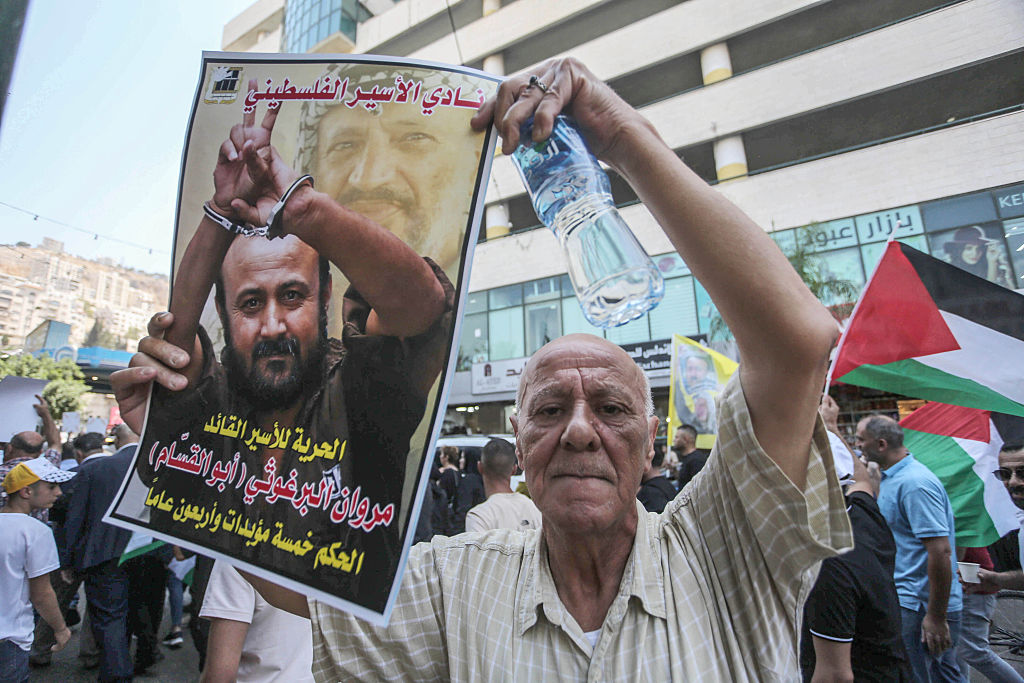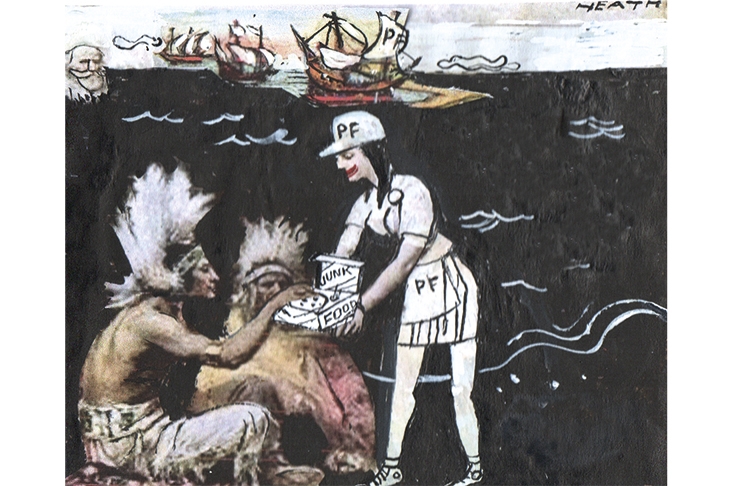Calls to release Marwan Barghouti – the leader of Fatah’s armed wing, who is currently serving multiple life sentences in Israel – is gaining traction. Supporters see him as the only credible Palestinian leader to challenge Hamas and negotiate peace. But freeing a convicted terrorist is never a simple calculation, and the risks are great.
Barghouti’s popularity dwarfs that of any other Palestinian figure. Polls found he could win 50 per cent of the vote if elections were held now, followed by Hamas’s Khalid Mishal (on 35 per cent) and Palestinian Authority (PA) leader Mahmoud Abbas (on 11 per cent) lagging far behind. Without Abbas in the running, Barghouti’s popularity rises to 58 per cent. If Barghouti wasn’t in the running, most Palestinians wouldn’t even bother voting.
He is both prisoner and symbol – seen by many Palestinians as their Nelson Mandela, and by some Israelis as a pragmatic nationalist who once genuinely believed in the Oslo accords
Once a young activist in the First Intifada and later a leader in the Second, Barghouti was convicted for orchestrating attacks that killed five Israeli civilians and given five consecutive life sentences plus 40 years. Two decades on, he is both prisoner and symbol – seen by many Palestinians as their Nelson Mandela, and by some Israelis as a pragmatic nationalist who once genuinely believed in the Oslo accords. His command of Hebrew and ability to talk to Israelis have long distinguished him from other Palestinian figures.
Hamas’s demand that he be freed in the latest hostage deal raised eyebrows: Fatah and Hamas are bitter rivals. His popularity could undermine Hamas’s attempts to control Gaza, and his supposed pragmatism could lead to peace with Israel – two things Hamas wants to avoid. So why did they want him out?
Releasing him would achieve several things. In the short term, it would make Hamas look powerful, capable of forcing Israel’s hand to release the most famous Palestinian prisoner. It could boost their popularity on the street, where Barghouti remains a unifying figure far beyond factional lines, and challenge the current PA leadership.
Hamas may hope that if they ‘liberate’ Barghouti, he might, at least initially, owe them. They could count on his gratitude, or at minimum his reluctance to directly confront them. But that calculation may prove short-sighted. Barghouti’s power lies precisely in his independence. A freed Barghouti could quickly eclipse Hamas, uniting Fatah’s fractured ranks and marginalising Gaza’s Islamist rulers. What Hamas sees as a short-term win could, in the longer term, risk the dominance they are attempting to reestablish and encourage more violent political in-fighting.
That perhaps explains Israel’s hesitation. Freeing Barghouti could change the entire Palestinian political landscape, and not necessarily in ways that serve Israel’s current government. A unified Palestinian leadership, capable of commanding real legitimacy, would strengthen the demand for statehood and pressure Israel to return to diplomacy. A ceasefire is one thing – peace is quite another. For a government that prefers fragmentation, that is a dangerous prospect.
Former Israeli officials have argued that Israel cannot indefinitely imprison the one man who might one day be a credible partner. Politicians on the left and right have viewed him as an articulate Palestinian proponent of peace with Israel – some even established friendly relations with him. Others, though, see ‘dangerous romanticism’ in that view – warning that another freed militant could follow the path of Yahya Sinwar, the Hamas chief released in the 2011 Gilad Shalit deal who went on to mastermind the October 7 attacks.
In prison, Barghouti’s legend has only grown. Reports from recently released detainees claim that guards beat him unconscious last month, breaking his ribs – allegations Israel denies. Whether true or not, the story reinforces the myth of the indomitable prisoner – the courageous leader suffering for his people while their corrupt politicians outside cling to their privileges.
Were Israel to release him, the gesture could signal confidence and hope – the belief that a negotiated peace is a feasible option. Or it could backfire if Barghouti, more hostile than ever following his time in prison, leads Palestinians down a path of more bloodshed. Israel’s security services would’ve had enough time to profile him extensively in prison and assess which outcome is likely – hopefully this has been done, although even if they support his release, it’s likely to be blocked by Israel’s hawkish security minister Itamar Ben Gvir.
Many of Israel’s decisions are now taken in Washington, so unless Trump decides that Barghouti is a gamble worth taking, Benjamin Netanyahu is unlikely to risk it. So long as his coalition depends on the hard-right, freeing Barghouti is political suicidal. Keeping him locked away preserves the status quo – a divided Palestinian movement and an Israel unpressured to make concessions.
Barghouti could be the bridge, or the bomb. Releasing him is a high risk/high reward dilemma for both sides. For Palestinians, he’s already the ‘president in waiting’. For Hamas, his absence is both convenient and threatening. And for Israel, he is the question they would rather not face: what happens if there really is a credible Palestinian leader ready to talk peace?







Comments